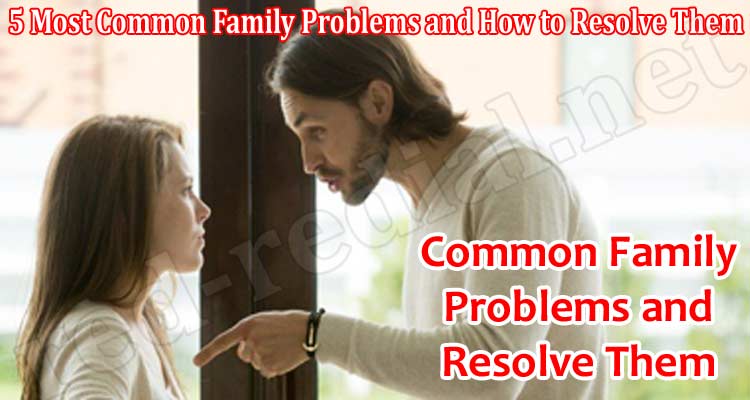5 Most Common Family Problems and How to Resolve Them
No matter how much you love your family, they can still get on your nerves! Family-related issues are more common than you might think.
You can spend your day laughing and joking with your loved ones and find yourself arguing in the evening. You might want to treat a family member to an expensive gift and then find that you are both arguing about the money just a few days later.
5 Common Family Problems and How to Manage Them
Although every family is unique, there are some common issues that tend to arise between family members. With life’s many pressures bearing down on everybody’s shoulders, family tensions can build and people can find themselves arguing more often than not.
Some arguments and issues aren’t very serious and can be resolved quickly. Others require professional help from a therapist, counselor, or Family Lawyer.
Below, we’re going to cover five of the most common family problems and how to resolve them.
1 – Poor Communication or Lack of Communication Altogether
Most of the time, conflicts arise from miscommunication or lack of communication altogether. Whether the issues are between partners, parents, or teenagers, poor communication is often a significant contributor.
As difficult as it can be to properly talk to your family members and open up about your thoughts and feelings, creating an open line of communication is important to build trust with your loved ones. You should feel safe raising your concerns with them and they should feel the same with you.
If you’re struggling to improve communication between you and your family members, you might benefit from having family therapy.
A family therapist can create a safe space for each of you to openly share your thoughts and feelings. They can also suggest helpful techniques that you can use to resolve future family issues.
2 – Physical and Emotional Distance
Large families rarely stay in the same location forever. Often, one or two individuals will move elsewhere to experience life in another city, town, or country. You might love long-distance relationships and they may work well for you.
But physical distance can be difficult for many people to deal with, especially between family members who are emotionally close.
This is a common problem between parents and their adult children. Many young adults choose to move away from home to live with friends or go traveling, and this can be difficult for parents to process.
There’s very little that you can do if your family members have moved away and now live a fair distance from your hometown. However, with the advancements in technology, video calls have never been easier.
Use platforms like Zoom and Skype to stay in touch with your family members. Maintaining regular communication keeps you emotionally and socially connected to your loved ones. You can catch up about what’s going on in each other’s lives and reminisce about funny memories.
3 – Ongoing Arguments and Conflicts
It’s normal to have an odd argument with your loved ones. However, minor arguments and conflicts can quickly escalate to something more serious. Ongoing arguments can put a lot of strain on your relationships, especially if they rarely get resolved.
During arguments, your emotions are heightened and you might find that you make hurtful comments toward your family members. If you don’t apologize and resolve the conflicts, they can linger in everybody’s minds.
When you’re constantly arguing with your loved ones, you might feel like there is no way out. You might feel trapped or confused, and worried about the future of your relationships.
Talking to a family therapist can be a great option when you’re struggling to overcome your differences. A therapist will enable you and your family members to identify the root cause of your arguments and how you can use healthier ways to overcome your issues.
You don’t always need to consult a family therapist if you’re arguing a lot at home. When you’re in the middle of a heated argument, take time out and go your separate ways for an hour or two.
You and the other people involved in the argument can think about what has happened and take a moment to calm down. After this point, you can come back together and have an open conversation about the issue at hand.
4 – Financial Worries and Money-Related Arguments
Nowadays, it’s not unusual to worry about money. The cost of living is increasing and life is getting more expensive.
Families and couples can often find themselves arguing about money or disagreeing about how to spend it. Even if each person in the family or partnership earns their own wages, financial strain can still cause a lot of conflicts.
Luckily, there are things that you can do to overcome money-related disagreements. Here are a few options to consider between you and your loved ones when you’re arguing about finances:
- Agree to keep your finances separate
- Create a monthly budget that is equally split between every family member
- Split the bills equally
- Agree to cut back on unnecessary expenses for a specified period of time
- Host monthly get-togethers where you can openly discuss finances
5 – High Levels of Stress
Stress might not seem like a family-related issue. After all, you can deal with stress internally, regardless of whether your loved ones are nearby or not.
However, high levels of stress can make you feel more irritable, causing you to verbally lash out at your loved ones or nitpick at minor things. When you’re psychologically stressed, you might retreat and isolate yourself, making your family members think that you don’t want to interact with them.
If your loved one doesn’t understand that you’re feeling stressed, they might think that you’re purposefully being nasty or avoidant. This can cause them to retaliate or fall out with you, escalating the issue even further.




